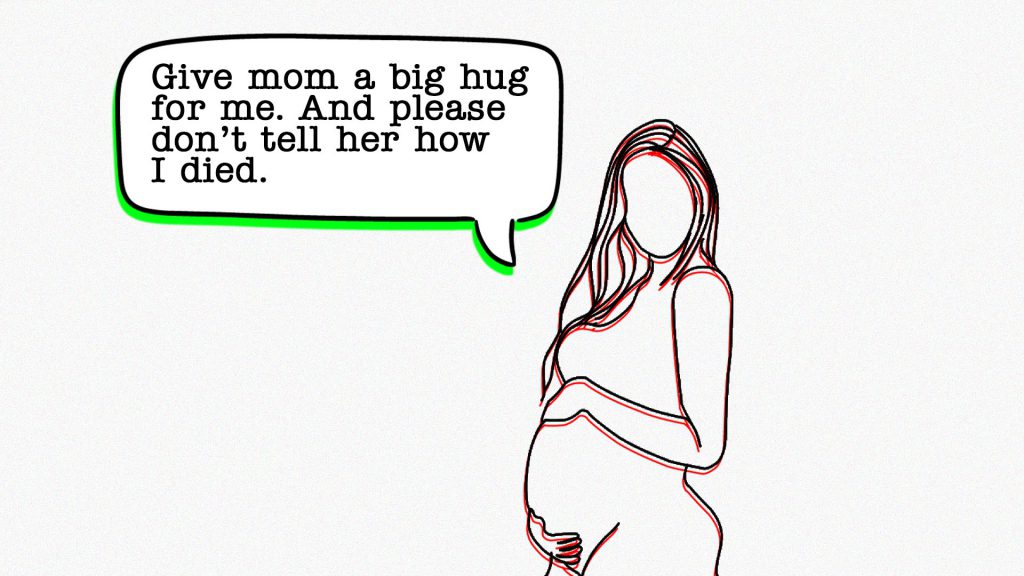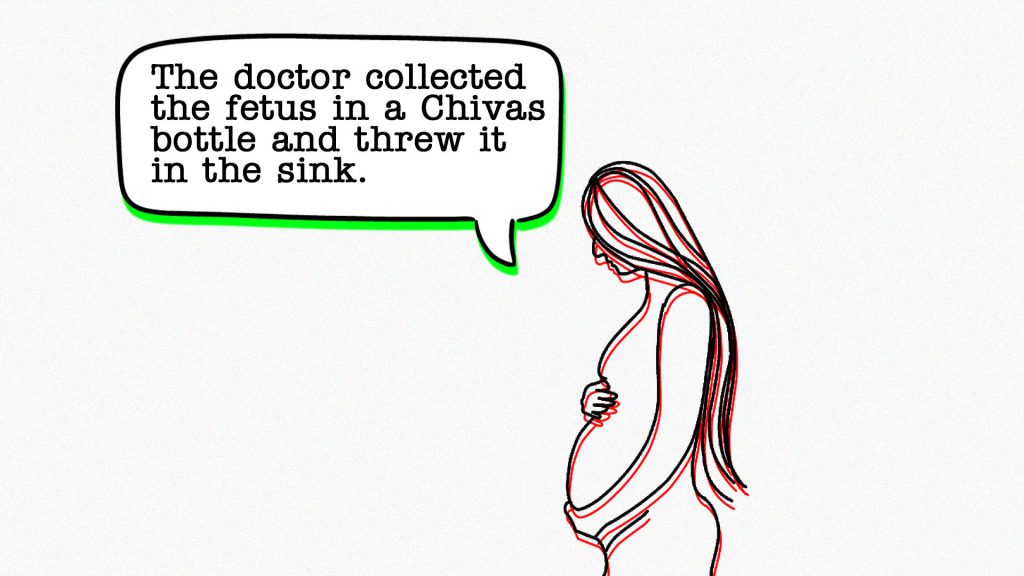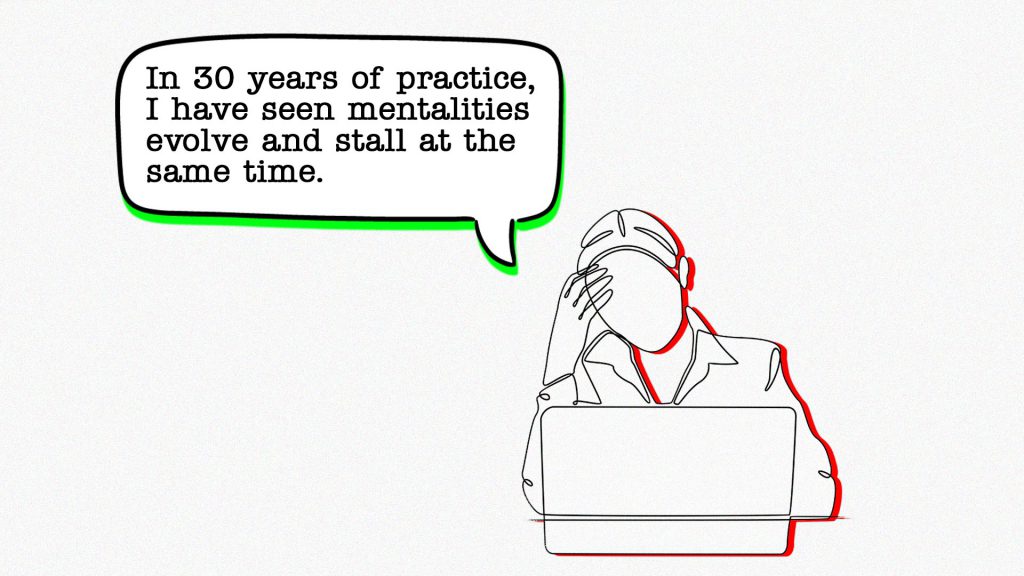“I was bleeding for a whole week. I felt very weak and collapsed, and was afraid I might die. I paid $500 for the procedure. I thought it was obvious what was wrong with me and I was so afraid somebody might notice and report me to the police, so I didn’t dare go to another doctor.”
Jessica recalled her horrifying experience seeking an abortion in one of the underground clinics of Burj Hammoud, located just on the outskirts of Beirut. She sat in the dirty backroom of a doctor’s office, where she was told to rest for a week but was not given sick leave.
When the Lebanese woman told her boyfriend that she was pregnant, he “actually just said it was disgusting that I was not in control of my body.”
She kept the abortion a secret from her religious Christian family for three years after the operation, silently suffering from the traumatic event that wreaked havoc on her mental health. Shortly after, she was taken into a psychiatric facility in Beirut for attempted suicide.
Jessica, whose name has been altered for her own safety, is not the exception. Her story resembles countless of Lebanese women’s experiences when clandestinely seeking unsafe abortion in Lebanon, a realistic and painful reflection of the operation’s aftermath and consequence on both their psychological and physical wellbeing.
Like so many other women, Jessica’s fear of social shaming and legal persecution pushed her not to seek post-abortion care that she urgently needed—despite her life being on the line.
“It is easier for women to get an abortion and to deal with its psychological consequences than to face their community and justify a sexual relationship and contraception outside of marriage,” said Dr. Hachem Baroud, a Lebanese gynecologist.
Women from all walks of life seek abortion

Imane, whose name has also been altered, took the abortion pill. It didn’t work, so she turned to surgery. The doctor requested additional money for anesthesia, which she couldn’t afford, so she underwent the surgery without it. She was severely distressed throughout the process and cried for days.
When she experienced complications afterwards, the doctor refused to see her again but she feared the likely legal consequences of going to another doctor. She told her father, who provided her with emotional support years after the abortion. However, she said she will always keep the secret from her mother.
Abortions don’t only happen outside of a marital bond or engagement. 21-year-old Sally (not her real name) had been engaged to her partner for eight months at the time she discovered she was pregnant. She and her partner had already bought a house and were in the process of furnishing it, but had yet to set a marriage date.
“He told me he would think about it [the pregnancy and the need to get married] as soon as possible,” said Sally. “After two days without any response from him, I called him. He asked me to get rid of the fetus.”
Despite crying and begging, her fiance would not budge. “I don’t know, I’m not even sure the child is mine,” he said.
“I was depressed. I didn’t understand what he was saying, that the child wasn’t his. Then he told me, ‘Maybe you cheated on me’.”
Sally went through with the abortion because her fiance did not trust her. They agreed that the fetus should not be kept, that her fiance would accompany her to the physician, and that he would pay for the operation. “He knew I didn’t have money and as soon as I had some money, I used it to buy things for the house.”
She says her partner was an important ally in helping her access an illegal abortion, but the relationship ended shortly after the procedure.
Men often play a strong role in influencing or coercing women to get an abortion, present in the decision-making process but unaware of its complications and repercussions on women.
“I don’t think they have problems. Why should they?” said Tarek, a Lebanese technician in his 50s who does not believe women suffer any physical or psychological complications after undergoing an abortion. He also believes it is always the woman’s responsibility to use contraception.
According to Lebanese artist Melissa Ghazale, male partners—and sometimes even doctors—often consider pregnancy, contraceptives and abortion to be strictly female matters. Men blame women for unwanted pregnancy, but always want to lead in the decision-making.
Aya described how her near-death experience with an unregulated abortion put everything and everyone she cared for on the line, but almost everyone in her life was unaware. The 23-year-old had entered a temporary marriage, and her sister helped her find a physician when she became pregnant.
“I told my sister. I told her everything. My sister and I are very close friends. At first, she was shocked,” said Aya, who later divorced and remarried. “I stayed at my sister’s house all the time. My brother-in-law was not aware of anything. He comes home late in the evening.”
Aya was afraid to go to her usual doctor because he knew her sister’s husband and the two were afraid he might tell him. Eventually, they would find another doctor.
“When I entered the clinic, I was afraid of dying,” said Aya. “I hugged my sister, and I begged her, ‘Take care of yourself and your children, and give mom a big hug for me… and please don’t tell her how I died.’ My sister started crying.”
The dangers of denying women abortion services



A gynecologist from Beirut who declined to give his name said he carries out three to four terminations every month, with 30% to 40% of his patients coming from other Arab countries.
He said that he does not perform an abortion if only one of the partners agrees to it. If young, unmarried couples approach him, he agrees. However, he refuses married women who might be pregnant from men other than their husbands. “It’s her own fault,” he said.
Majed, a physician from Mount Lebanon, used to refuse women in the beginning. “Later on, I accepted doing the operations because the patients were self-medicating.”
Christina (not her real name) was married for 13 years and has three children, aged 3, 11, and 12. She has undergone two abortions. “I got pregnant before having my youngest daughter. I told my husband, and he wouldn’t let me keep the fetus because he was unemployed,” she explained.
She told the story to a pharmacist, who sold her medicine and told her to put two tablets in her vagina. Christina followed her instructions and began to bleed. In fear, she and her husband visited a physician.
“[The physician] blamed me,” she said. “I had consulted him before to ask about getting an abortion, but he refused. That’s why I consulted the pharmacist.”
The physician then operated on her without anesthesia.
She feared another hemorrhage for her second abortion, so she contacted her physician immediately. “I informed him that if he wasn’t going to do the abortion, I would take the same medicine. So, he gave me an appointment at the hospital.”
“I went to the hospital, and my husband accompanied me to formalize all necessary papers, since I was insured by the National Social Security Fund,” said Christina. “The physician didn’t say that it was a voluntary abortion but an abortion because of bleeding.”
Her fears are not unwarranted. Dr. Faysal El Kak, Vice President FIGO and director of AUB WISH Program, has dealt with the severe and life-threatening repercussions of unregulated procedures.
“I once had a patient who had gone through a procedure to evacuate the gestational sac, but it hadn’t been done properly so she continued bleeding for 20 days. There are also cases of serious infections or incomplete emptying of a uterus. We sometimes have to save the women’s fertility and even life,” said El Kak.
Lebanese women also described the alarmingly unprofessional and unethical conditions surrounding clandestine abortions, and how they were performed. Some even experienced sexual harassment from physicians during or after the operation.
One woman borrowed $500 from her friends for an abortion in a poor neighborhood of Beirut. “The only way you could tell it was a clinic was by the paper sign on the door.”
She described her doctor as unprofessional, adding that the nurse—his wife—wore slippers. “My friend, who stayed with me while I was unconscious, told me the doctor collected the fetus in a Chivas bottle and threw it in the sink.”
“After the operation, he started calling me to hit on me.”
The need for sex education



“Women share false ideas about contraception and sexuality among themselves. Mothers also misinform their daughters,” said Mona Hachem Baroud, a gynecologist. “For example, in Lebanon, women think that taking contraceptive pills can lead to infertility. I had patients who got abortions up to seven or eight times. Some women are just not conscious of their actions. Others are not well informed by their gynecologist.”
Hachem Baroud mentioned Europe, where doctors have to explain the risks related to abortion and unprotected sex to their patients. However in a patriarchal society like Lebanon, where a woman’s virginity is often still considered to be her most precious asset, women are willing to risk their health to save their reputation.
“In 30 years of practice, I have seen mentalities evolve and stall at the same time,” she said. “In one day for example, I can see a very emancipated young woman coming to be examined because she is sexually active, but she won’t ask about the contraceptive pill. Right after, I will examine a woman who is completely submissive and highly influenced by archaic mentalities. In some regions of Lebanon, honor crimes still exist. Things are evolving only in very privileged communities.”
Some of the most alarming abortion cases are ones sought by young school girls who have no solid understanding or control over their sexual health—for lack of financial independence—and haven’t received proper sexual education. They are especially prone to sexual exploitation, sexual abuse and blackmailing.
Hyam, a female physician from South Lebanon, recounted a girl arriving at her clinic with her school bag. The 16 or 17-year-old girl hadn’t gotten her period in 2 months.
“I knew her mother, a decent person,” mentioned Hyam. “I explained to her that she was pregnant. She was terrified. She begged me to help her. She told me that her mother could kill her.”
“You feel she’s like your daughter. I made her cry a lot. I don’t want her to have other sexual relationships.”
Sometimes, Hyam runs into the girl at the market. “She lowers her head. She feels ashamed.”
Lebanon lacks a nationwide Comprehensive Sexual Education (CSE) in school curriculums. A 2021 study aimed to assess the level of knowledge and awareness related to sexual and reproductive health (SRH) among single unmarried women living in Lebanon and found that only 8.8% of all the participants had adequate knowledge.
The highest level of SRH related knowledge was about pregnancy (88%) and the least was about contraception (13.5%). Visiting a gynecologist did not affect the overall level of knowledge.
The legal basis of criminalizing abortion in Lebanon
The most dangerous part about this exception constitutes a blatant violation of bodily autonomy, consent and physical integrity.
Abortion in Lebanon is still criminalized by the Lebanese Penal Code as a “reckless act of deliberate murder.”
The basis of the criminalization of abortion is found in not one, not two, but eight articles of the penal code (Articles 539 to 546) that—in principle—prohibit abortion under all circumstances except to save the pregnant woman’s life.
The scope of the ban is broad and inclusive. It prosecutes women, as well as the doctor/physician and the nurses who aided and abetted the “criminal” operation, witnessed or allowed it to occur without reporting it to local authorities and taking the necessary steps in this regard as stipulated by law.
Under the penal code all the following acts are prohibited and punishable:
- The selling of substances used to induce abortion.
- The dissemination of information on abortion or methods used to facilitate it.
- The selling or accusation of objects that are designed to perform it.
- Aiding and Abetting: Individuals who induce or aid women in performing an abortion are subjected to one to three years of imprisonment, while the woman herself is subjected to a imprisonment for anywhere between six months and three years.
- Instigating or encouraging the woman to undergo abortion.
The penalty stipulated by law is imprisonment of six months to three years for the principal (the woman inducing abortion) and one to three years for the aider or instigator (physician).
Article 545 stipulates an exception in the form of a mitigating/attenuating factor or circumstance, which is the case of a woman who has an abortion to “save her honor” without defining what that actually means. The Penal Code actually includes various situations that might fit under the category, such as pregnancy among unmarried women and pregnancy resulting from rape.
The most dangerous part about this exception constitutes a blatant violation of bodily autonomy, consent and physical integrity: The benefit of an attenuating excuse also applies to the person contributing to an abortion to save the honor of a family member or a relative, with or without the woman’s consent. This means that a physician may be excused from the legal penalty of performing an abortion on a woman to “save her honor” against her will.
Presidential Decree No. 13187, dated October 20, 1969, reaffirms the prohibition of abortion but modifies the Penal Code by permitting it if needed to save the pregnant woman’s life—therapeutic abortion.
Therapeutic abortions are currently allowed based on the conditions specified in article 32 of the Medical Ethics Law No. 288 of February 22, 1994. The law indicates that the attending physician must consult with two other physicians who have also performed a medical examination on the woman before performing an abortion, and they all must agree that the woman’s life can be saved only through the procedure.
The total number of legal abortions, including spontaneous abortions, reported by hospitals to the Vital Data Observatory at Lebanon’s Ministry of Public Health was 10,913 in 2014.
The criminalization of abortion in Lebanon has proven to be of a primitive nature and, most importantly, highly ineffective in deterring women from getting abortions. On the contrary, it has only increased unsafe abortions.
They are dependent on dubious doctors and many of the women are willing to pay any amount named.
“What we see is that the law does not influence a woman’s decision to have an abortion. If there’s an unplanned pregnancy, it does not matter if the law is restrictive or liberal,” Dr. Paul Van Look, the director of the World Health Organization’s (WHO) Department of Reproductive Health and Research, told The New York Times.
One in four pregnancies ends in abortion worldwide —about 56m a year—according to new global data which shows that criminalizing abortion does not make it any less frequent.
WHO also reported that the rate of unsafe abortions is four times higher in countries with restrictive abortion laws than in countries where abortion is legal. The criminal prosecution and restrictions women and girls face, especially ones in poor rural areas, force them into unregulated and unsafe abortions that puts their lives at risk each year.
Countries like Lebanon, with restrictive abortion laws, also often lack access to contraception. Low-income nations where abortion is restricted have more than three times the unintended pregnancy rate as high-income countries where abortion is legal.
“Even if abortion is legal, unwanted pregnancies put women under pressure. It’s hard to decide what they actually want,” said Lisa, a Lebanese NGO worker.
“As it’s illegal, they additionally fear legal consequences and don’t know where to get informed. They are dependent on dubious doctors and many of the women are willing to pay any amount named.”
The penal code’s prohibition of the “dissemination of propaganda” relating to abortion means advocating or lobbying for its legalization is full of obstacles and challenges. Most NGOs and gynecologists fear talking about abortion or conducting research or providing information due to the strong legal prohibition.
Unmet contraceptive needs & increased unintended pregnancies
Globally, more than 218 million women of reproductive age in low and middle-income countries aren’t using modern forms of contraception. In the lowest-income countries, nearly half (46%) of women who don’t want to become pregnant don’t use modern forms of contraception or are using traditional methods—like periodic abstinence or withdrawal—that put them at high risk of unintended pregnancies.
Among women who want to avoid a pregnancy, unmet need is disproportionately high for adolescents aged 15–19 (43%), compared with that among all women aged 15–49 (24%).
Knowing that Lebanon is currently facing its biggest and most alarming economic crisis since the Lebanese Civil War of 1975, Lebanese women living in poverty and Syrian and Palestinian refugee women are hit the hardest and experience the most unintended pregnancies due to the lack of family planning options.
Aside from the financial collapse, Lebanon’s severe first and second wave of COVID-19 manifested itself in a myriad of obstacles and complications in the sexual and reproductive health sector.
To treat COVID-19, hospitals and clinics deprioritized the other services they provide—including abortions.
Since the onset of COVID-19, 42.43% of Lebanese women reported that they have had no access to family planning and SRHR services. 83% of those women reported that fear of COVID-19 transmission is a barrier for them accessing SRHR services. This gap especially affects pregnant women and leads to an increased risk of pregnancy complications.
Additionally, women experienced a significant increase in unintended pregnancies: 80% among women with a history of unwanted pregnancy, 54.5% among women who worked from home, 50% among women who sometimes discussed family planning with their partner, 50% among women who desired to stop childbearing, and 57.1% among women who did not regularly visit their physician. Unplanned pregnancies in turn led to an increase in unsafe abortion.
Economic factors and the financial exploitation of women



Nawal had to steal a golden bracelet from her mother to secure the funds needed for her abortion, at odds with her ethics and morals. “The price was a big problem.”
The 27-year-old Lebanese woman went to her first appointment with the physician without any money. He set the abortion date for the next day.
“I didn’t even have $10 of the $400 he requested,” she said.
In Lebanon, the price of an illegal abortion varies between $150 and $2,400.
Based on an interview with a gynecologist from Beirut, a number of factors determine the cost: the physician’s status (credentials and reputation), the location of the medical clinic (urban versus rural and economically privileged versus disadvantaged neighborhood), the client’s financial means, and the characteristics of the demand (for example, early versus late pregnancy).
Former AUB professor Dr. Zeina Fathallah describes abortion in Lebanon as a “privilege” and not a right, since access to an abortion procedure is reliant on the woman’s social capital, networking, negotiation skills, marital status and socioeconomic background.
Fathallah listed some of the additional factors that physicians take into consideration before agreeing to perform an abortion, specifically the possibility (or impossibility) of marriage and the pregnancy stage.
Doctors in such unregulated settings with no medical or legal surveillance can extort a high amount of money from desperate women, according to NGO worker Lisa.
She added that there is also the risk that the gynecologist may not accept the woman as a patient, likening this reality to a black market where the undetermined fates of women turn into opportunities for profit and “trade” transactions.
According to WHO scientist Dr. Bela Ganatra, “nearly $300 million is spent each year on treating the complications from unsafe abortions.”
Women are being denied a fundamental human right
It is estimated that unplanned pregnancies, unsafe abortions and maternal deaths would drop by about two-thirds if all women had access to affordable modern contraceptives and all pregnant women were to receive care that meets international standards.
In other words, Lebanon should place greater importance in improving the sexual and reproductive health and rights (SRHR) of its women by ensuring medical consultations are inclusive and affordable to them no matter their socio-economic backgrounds.
Moreover, comprehensive sexual education should be adopted in school curriculums to empower young women to make informed decisions and protect them from unplanned pregnancies and sexually transmitted infections or diseases.
The Lebanese law needs to ensure women’s autonomy over their own bodies, as well as their sexual and reproductive health rights (SRHR). Women who are denied their bodily rights are missing an essential bedrock for achieving gender equality in all aspects of their lives, with human rights being indivisible and interdependent.
Women are inherently entitled to the freedom of choice, right of self-determination, self-ownership over their bodies and bodily integrity. Instead in Lebanon, women are shamed, terrified, and criminally prosecuted for seeking abortions and other sexual health services.


